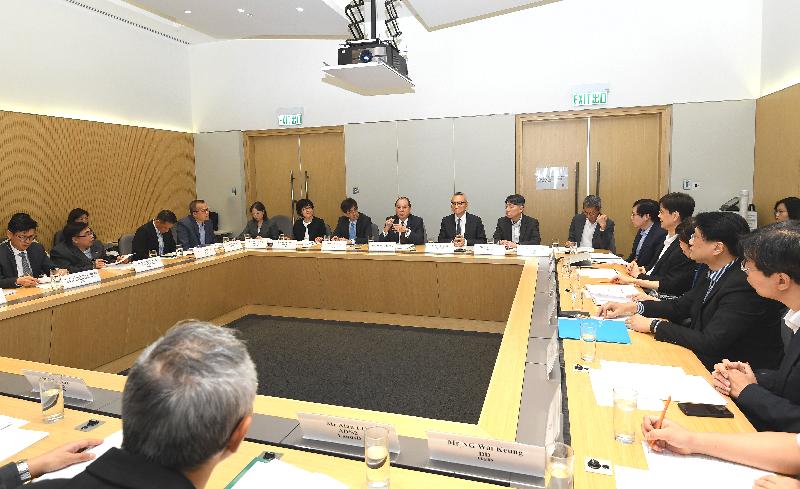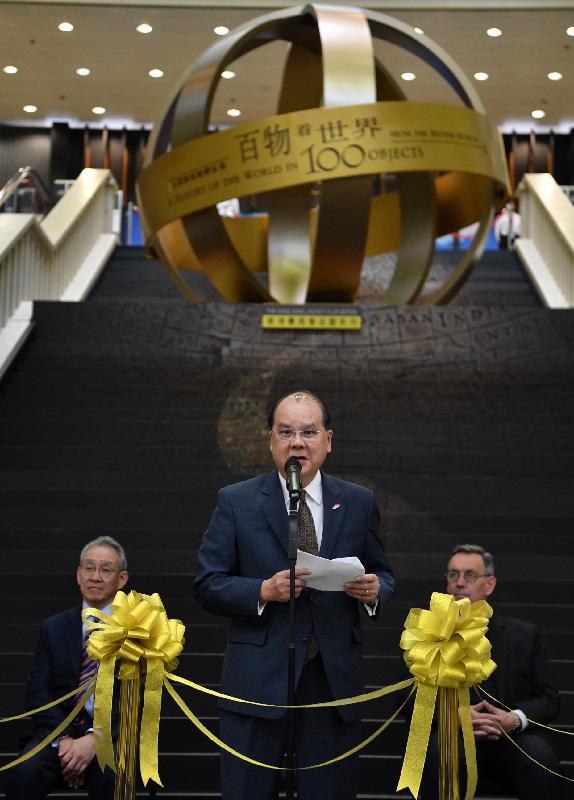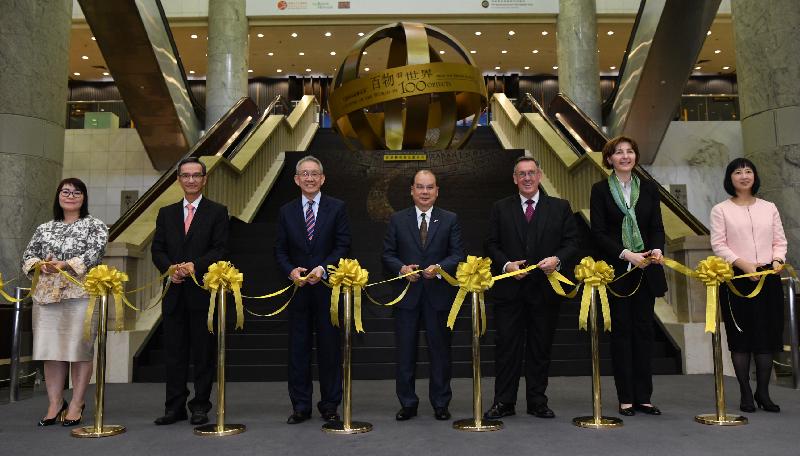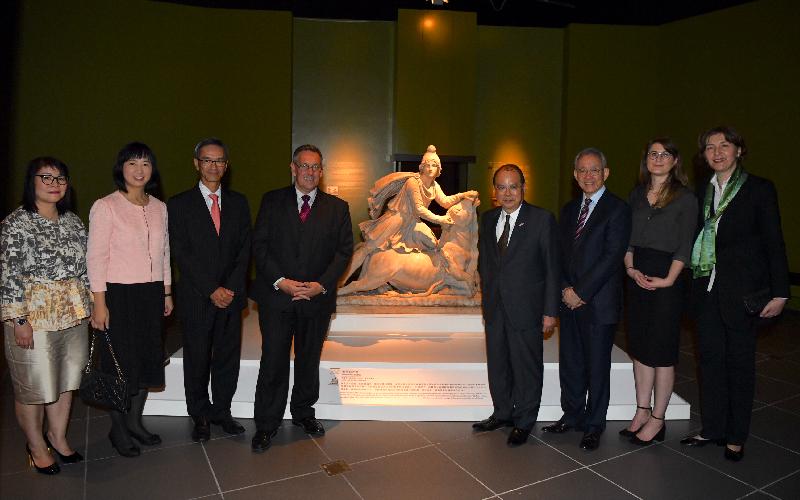The Chief Secretary for Administration, Mr Matthew Cheung Kin-chung, today (May 17) said at a special meeting of the Pest Control Steering Committee of the Food and Health Bureau that in view of the three recent cases of human infection by rat Hepatitis E virus (HEV) in Hong Kong, the relevant government bureaux and departments should carry out anti-rodent work in areas under their purview to improve environmental hygiene and prevent rodent infestation.
Various government departments will jointly conduct territory-wide cleaning work in areas under their respective purview, particularly in target areas including rear lanes, housing estates, food premises and public markets.
Mr Cheung said, "The Government has all along been very concerned about rodent infestation in various districts. In collaboration with various districts, we will conduct a three-month cleaning campaign over the territory from May 20 to strengthen the prevention and control of rodent at hygiene black spots and focus areas.
"A co-operation mechanism on pest control has been put in place among various departments. I would like to reiterate the importance of collaboration among departments and their concerted efforts in improving environmental hygiene. The Government will continue to allocate resources with a view to improving the relevant work."
Apart from the anti-rodent operations in designated target areas conducted in nine public housing estates, the Housing Department will extend the operation to more public housing estates. The Home Affairs Department will enhance liaison with property management companies and different stakeholders, and carry out publicity at district level to raise public awareness of maintaining personal and environmental hygiene as well as proactively preventing rodent infestation in private places including households and housing estates. The Highways Department will also implement improvement work such as filling rat holes and improving road conditions at rear lanes where rodent problems are more serious.
The Food and Environmental Hygiene Department (FEHD) will enhance targeted rodent prevention and control work at problematic spots and strengthen education and publicity, together with other relevant government departments. The eight-week anti-rodent operations in designated target areas has commenced on May 6. The FEHD has also enhanced cleaning services at streets and rear lanes in the target areas as well as cleansing work of markets and hawker bazaars, so as to keep the environment clean.
Since improper handling of food waste by food premises can give rise to rodent problems, the FEHD will start a five-week special operation from May 20, to target irregularities of food premises such as food preparation, scullery, improper storage of articles and illegal dumping of refuse at rear lanes (including dumping of bagged refuse in the small hours), with a view to further enhancing the awareness of rodent prevention and control among the operators of food premises as well as stepping up enforcement actions.
The Acting Secretary for Food and Health, Dr Chui Tak-yi, who is also the Chairman of the Steering Committee, noted that apart from collaboration among departments, the co-operation and support of the community is essential to eliminate rodent problems. Members of the public should maintain good personal and environmental hygiene and pay attention to food hygiene, in order to prevent rodent borne diseases.
At the special meeting today, representatives from bureaux and departments were first briefed by the Department of Health on the latest information on human infection of HEV, followed by the discussion on public education and strategies of rodent prevention and control.
Prevention of HEV
Although HEV is a curable disease, proper preventive measures should be adopted. To prevent HEV infection, members of the public should pay special attention to personal, food and environmental hygiene. For example, they should wash hands thoroughly before eating, store food properly or in the refrigerator, not leave food at room temperature for a long time, and use 1 in 99 diluted household bleach for general cleaning purpose. High-risk individuals, such as elderly with major underlying illness (especially those who have undergone organ transplantation), pregnant women, patients with chronic liver disease and patients with Glucose-6-Phosphate Dehydrogenase Deficiency (also known as G6PD Deficiency), who are infected with HEV may develop serious illness, therefore they should exercise extra caution.
To cause human infection, HEV is transmitted mainly through the faecal-oral route, for example, due to faecal contamination of drinking water. In addition, foodborne transmission can result from ingestion of undercooked meat or meat products produced from infected animals (HEV has been detected in pig livers). Other rare transmission routes identified include transfusion of infected blood products, organ transplant and vertical transmission from a pregnant woman to her foetus.
Five Keys should be adopted for food safety when handling food, i.e. Choose (Choose safe raw materials); Clean (Keep hands and utensils clean); Separate (Separate raw and cooked food); Cook (Cook thoroughly); and Safe Temperature (Keep food at safe temperature) to prevent foodborne diseases.
The public are advised to adopt the following preventive measures:
* Eliminate sources of food and nesting places for rodents in living environment. Store food in covered containers and handle pet food properly to avoid it becoming food for rodents;
* Store all refuse and food remnants in dustbins with well-fitted cover. Dustbins must be emptied at least once a day;
* Keep premises, especially refuse rooms and stairways clean. Avoid accumulation of articles;
* Inspect all flowerbeds and pavements for rodent infestation regularly; and
* Avoid high risk activities below to reduce rodent contact:
– Avoid rodent contact and places dirtied with rodent excreta;
– Avoid handling rodents with bare hands;
– Wash hands with liquid soap and water immediately after handling animals, and disinfect contaminated areas; and
– If wound appears, clean broken skin immediately and cover it properly with waterproof adhesive dressings.
Representatives from three bureaux and 21 departments/organisations attended today's special meeting.




